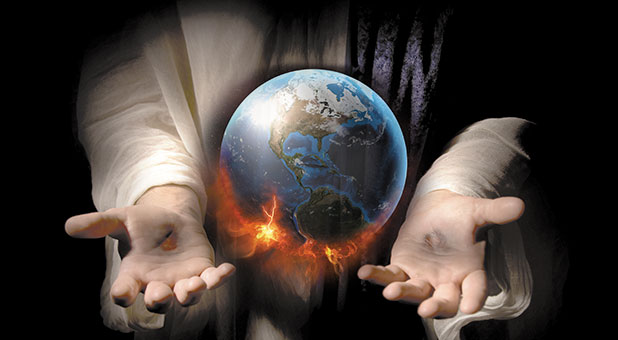Can Christians Destroy the Planet Before Jesus Returns?
Shortly after entering ministry, I had an experience that forever changed the way I think about the church and the environment.
During my first few years of pastoral ministry, I served the spiritual needs of college students on the campus of a major research university on the West Coast. During that season, the Pentecostal church where I served discovered that one of its buildings had become something of an environmental mess. There was sickening air, toxin leaks into the soil and a generally unusable environment. After weighing the options, the church made the decision to tear down and rebuild the building.
It was a clear, beautiful day—a rarity in the Pacific Northwest—when they took a concrete wrecking ball to the building. As I watched the structure get demolished, I quickly discerned that the building had been built of materials that were subpar at best. The structure looked like it had been made of papier-mâché. No wonder it had decayed. I had no doubt the church made the correct call: This building needed to come down.
Then another thought came to my mind: This was a relatively new building. Having been built in the decades before, this church had been erected to serve the growing needs of a growing congregation during the Jesus movement of the 1970s. Yet I could tell by the debris on the ground that the building had not been built with the long-term in view.
I turned to my senior pastor who stood next to me and asked him what was on my mind: Why had they built this building so poorly just a few years earlier?
What I learned changed my life—and my outlook on the environment. My senior pastor’s answer was simple: They had built that building believing Jesus would be back by the end of the year.
The Upgrade Effect
I learned something that day at the demolition: Our theology actually matters. Our ideas, thoughts and concepts about God, Jesus, the Holy Spirit and their kingdom actually have a deep impact on the way we live and embody our lives. Our lives are, in many respects, a reflection of our ideas. From the worst of human thinking—like slavery, eugenics and racism—to the best of human thinking—a cure for polio, medicine and the lightbulb—the world is impacted by ideas. Even every building exists as the result of a person’s thought or dream.
As Dallas Willard writes in Hearing God, “We live at the mercy of our ideas.”
But I had never considered how true that was for the land, creation and the environments in which we live. Since that day standing out and watching a building come down, I have reconsidered what it means to be a Christian in the world. Now I see that I need to think critically about the way I think. I need to take the Bible all the more seriously, because my theology matters—and it changes the way we live on this planet.
Now don’t misunderstand me. I fully believe that Jesus is coming back! My hope and yearning for the return of Christ keep me going like a carbon-neutral fuel from heaven. I’ve based my entire Christian faith on the hope that Jesus will return and make a world of righteousness, goodness, mercy and equity. Our future in the New Jerusalem is beyond comprehension.
The problem is not that Jesus is coming back. The problem has become that so many of today’s Christians see the return of Jesus Christ as a kind of “theological hall pass” to not take seriously the call God has placed on humans to care for the earth. In short, our belief in Jesus’ return has been a tool to escape—rather than a tool to enter and care for the garden.
Scripture makes clear the fact of Christ’s return is the actual rationale for why we do the work of God’s kingdom here and now. It is because of Christ’s return that we care for the poor and the widow. It is because of Christ’s return that we repent and turn from our sin. It is because of Christ’s return that we stop living in sexual immorality, selfishness and hatred. Christ’s return—for the New Testament—is the very essence and rationale for ethics.
As Martin Luther once said, “If I knew Jesus was coming back tomorrow, I’d still plant an apple tree today.”
Still, when we know something nears its end, we are far more likely to treat it as though its end is near. We can see this in how we treat our stuff. It is widely known in the tech world that when a new iPhone comes out, there is suddenly a spike in broken iPhones of the older generations. Why? Because when a new iPhone comes out, we either stop taking care of the old one or, even worse, start treating our existing iPhones far worse in hopes of getting a new one. Tech experts call it the “upgrade effect,” and it has been widely reported.
Too often for Christians, our knowledge of the coming world has become a reason we treat the current one so poorly. When it comes to the environment, the saying is often unfortunately accurate: Christians are so heavenly minded that they are of no earthly good. None of us wish this were true. But it often is.
Even more so, sometimes we think the fact that Christ is returning is the reason we should destroy the earth. This may sound extreme, but I once ran into a Pentecostal church in Australia that refused to recycle so they could help speed up the Lord’s return. Rather than seeing the return of Jesus as a reason to take caring for the earth seriously, we see it as the reason we should treat it like a trash can.
The Gardener
But how did we get here? The whole story of caring for this earth goes back to the first page of the Bible. In the ancient cosmology story of the Bible, we find an intricate and perfectly woven-together account of how God made everything. God made a world. Then He put a place called Eden in that world. Then He placed humanity in that garden. Those two humans would soon be identified as Adam and Eve.
In that garden, God gives out some job descriptions. God comes to this first pair of humans and names their assignments. In fact—as Derek Kidner points out in his commentary on Genesis 1—out of all the creations God makes, humans are the only ones to get a job description. They are assigned to be creative, to have children, to eat, to name animals and to “take care of” the garden.
When we look at the account, the fact that humans are the only created beings given a job description is unique. Why did God start a garden? God didn’t do so because He needed more vegetables. He started the garden because he wanted someone to garden with. God could easily do all the ministry—but He doesn’t, because this God has co-workers. Yahweh gives His friends a job description: to “till it and to keep” the garden (Gen. 2:15b).
Don’t miss it. The Hebrew word “to keep” is the same word as “worship” throughout the Old Testament. The implication is profound and breathtaking. To “keep” the Garden of Eden was to worship God. They were one and the same thing. And the reason they were one and the same was because the Garden of Eden was not Adam and Eve’s garden. It was God’s garden.
God is the gardener, and this is His garden.
When the reader looks at God’s creating sequence day after day in the Genesis account, they find that God Himself is the one who plants the trees in the garden. In Genesis 2:9, God Himself establishes the garden and takes the time to plant the trees that would grow in it. Our first image of God in the garden—and the first image the first humans would have seen—was as the God who was a gardener. To keep this garden meant you worshipped God, because it was God’s garden. To care for the things God cares for is to worship the Creator.
The intimacy Adam and Eve shared with God was immediately fractured by their disobedience. The Bible tells us they were “banished” from His presence. Another interesting point from the language of the text is that the Hebrew word for “banish” is the same as “divorce.” This illuminates how the first humans not only lost the space of the garden, but the face-to-face intimacy they shared with God the gardener.
To further emphasize the sadness of this moment, the ancient Greek translators of the Old Testament (known as the Septuagint) opted to use the word ekballw—Adam and Eve were “sent into” the desert outside the garden. They used the same word to describe Jesus’ own journey into the desert to be tempted by the devil: “Jesus was sent into the desert.”
Humanity has been divorced from God’s ideal, God’s presence and the face-to-face intimacy they once knew with Him.
One of the immediate results of “banishment” is how humans now have an altered relationship to the land. This alienation is seen in a number of ways. For one, there is a new anxiety not previously known to man. The whole paradigm of human work now moves from working with God to care for the land to working the land. Previously, the work was without anxiety. But as New York University’s Daniel Fleming has shown, the phrase “by the sweat of your brow” does not mean that physical labor is cursed. Rather, this was an ancient way of speaking of a new anxiety around work that is the result of fear and accomplishment. The world is now marked by anxiety to perform. Sin, in the words of Sandra Richter, now makes work all about “perspiration-inducing fear.” Humanity ceases to work freely with God. Now, people start anxiously treating God as though He is a slave-owner.
More than sheer anxiety, the fundamentally altered relationship between humanity and the earth is marked by alienation. Notice that when God tells Adam what will happen as a result of his sin, He says he will work the ground, and it will produce “thorns and thistles” (Gen. 3:18a). This is the new human condition. Humans will work, work, work. But now, their experience of alienation and separation is found in the fruitlessness of their labor. No longer can they rest in the joy of a good day’s work. Work becomes fruitless.
Of course, all this alienation from the land sets the stage for the Christian gospel. It is no mistake that the Gospel writer Luke points out that in Gethsemane, Jesus sweats blood (see Luke 22:44) out of the anxiety of having to face His execution. On top of that, He wears on His head the crown of thorns. In one fell swoop, Christ wears the anxiety of our alienation and the mark of our curse on His head. The results of the sin of humanity are now on Him.
Could it be that, in healing us of the curse, He is simultaneously healing our broken relationship to the garden?
The Return
The rest of the Bible is about God’s saving work in returning humanity back to the garden of Eden—the presence of God. In fact, when we read the final few chapters of the Bible in Revelation, we find ourselves where we were in the beginning. The New Jerusalem is Eden! How do we know? The same rivers that flowed from Eden are now flowing out of the new city. The same trees are there. As my friend John Mark Comer has written, the whole story of the Bible is moving from a garden to a city.
This is the entire biblical framework for why we care for the garden, God’s good earth. We don’t do it primarily because we want to save polar bears (though we do want the polar bears to live, be whole and thrive the way God dreamed for them). We care for God’s planet simply because it is God’s, and anything that is His is worth caring for.
We don’t save the planet. Christ does that. We keep the planet. By God’s grace, this allows us to understand we play a role but don’t need to have a Messiah complex. God saves. We are faithful.
What we actually find is that the work of Jesus was the beginning of God bringing us back to the garden. On the first Sunday after the death of Jesus, John 20 tells the story of the women who went to the tomb. Mary, one such woman, went to the tomb where Jesus was buried for reasons we do not know. Did she believe Jesus would be resurrected? Was she going to anoint His body for death? Was she going to grieve?
Whatever her reason, she’s at the tomb. And as she approaches, she sees that the rock that had been placed over the tomb has been moved—very uncommon in an ancient world where Jews were to keep clear boundaries away from the dead. Touching the dead would mean ritual impurity. This encounter rightly leads her to wonder: Where did Jesus go?
It is there, as she comes out of the empty tomb—finding no body there—that she encounters somebody outside the tomb. Startled, she sees someone that she believes to be a gardener. Why? She is in a garden. But then all of a sudden, the gardener calls her by name: “Mary.”
We often get down on Mary for getting so confused. How could she think Jesus was a gardener? But now, in light of the story of God and His world—of a God who started a world and planted some trees in a garden as a gardener—it makes more sense. She thought He was a gardener—and she wasn’t off. The gardener, the one from the beginning, is back. And we are with Him in a garden once again.
The Vineyard
Before His earthly ministry was completed, Jesus told many parables. One such parable, which He tells in many of the Gospels, is about a vineyard owner who goes away. What does he do with his vineyard? He leaves it in the hands of the hired hands. Their task—as was common in the ancient world—was to care for the land with love and thought and intentionality. When the vineyard owner returns, they are judged based on what they did to the vineyard owner’s son and how they cared for his land in light of that.
Jesus is returning. And for too long, the Christian church has lied and been lied to that the issues of caring for the planet were strictly ideological and partisan. For too long, to care for the earth has been the issue of the Democrats, while caring for the economy has been Republicans’ focus. But this is a lie. We care for the earth not because our political party tells us to; we care for the garden because the gardener tells us to. And neither party gets our allegiance.
Realizing the return of Jesus puts great responsibility on us. The call to care for and keep the garden was never undone. The task is still ours. And we will face the gardener someday. The words of Revelation 11:8b (NIV) still count about the judgment: “The time has come … to destroy those who destroy the earth.”
May we be humbled. We have been made by a gardener. We have been saved by a gardener. And we will spend our future in the renewed garden.
Do you hear the voice of the gardener?
READ MORE: To learn more about creation care, read more stories at creation.charismamag.com.
A.J. Swoboda, Ph.D., is assistant professor of Bible, theology and world Christianity at Northwest Christian University in Eugene, Oregon. He is the author of Subversive Sabbath (Brazos).
CHARISMA is the only magazine dedicated to reporting on what the Holy Spirit is doing in the lives of believers around the world. If you are thirsty for more of God’s presence and His Holy Spirit, subscribe to CHARISMA and join a family of believers that choose to live life in the Spirit. CLICK HERE for a special offer.







































